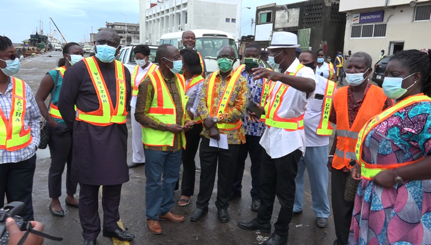
The Parliamentary Select Committee on Food, Agriculture and Cocoa Affairs has embarked on a monitoring and fact-finding visit to the Tema Fishing Harbour, to interact with producers and processors in the fishing industry in addition to observing industrial fishing vessels discharging fish at the fishing harbour.
The members of the parliamentary select committee first visited the inner harbour to observe the discharging of tuna from tuna vessels, as well as trawl vessels.
The parliamentarians also walked through the fish market and canoe basin to interact with the fishing community on developments regarding the preservation and trade in fish.
In a meeting with the National Fisheries Association of Ghana (NAFAG), the Association revealed that some challenges that face the fisheries sector, include inadequate supply of anchovy for pole and line tuna fishing, expensive license fees for industrial fishing vessels, high cost of marine gas oil as well as safety concerns of fishing vessels and crew at sea.
NAFAG appealed for the support of the members of parliament, to address the fishing license cost in particular which is currently at a price of USD135 per gross registered tonnage. According to them, if nothing is done about it immediately, the Pole and Line vessels would be rendered inoperative.
The Parliamentary Select Committee on Food, Agriculture and Cocoa Affairs also interacted with the Ghana Navy who highlighted the growing threat of piracy to fishing vessels in the Gulf of Guinea.
The Ranking Member of the Parliamentary Select Committee, Kwasi-Etu Bonde, said the fisheries sector employs about 10% of Ghana’s population, and thus, the need to embark on such working visits, to ascertain developments that have significant influence on the industry.
“As policy makers, it is our duty to support them so that the 10% of human resource they are using can contribute more than the 4.8% they are contributing to the National GDP. Maybe in the long term if this 10% is contributing about 10% and the national GDP, it will expand the job creation base. The tuna sector for instance, has a lot of potential for the country,” he elaborated.
He assured of his outfit’s commitment to take up all the issues with parliament in order to mitigate some of the challenges in the fisheries sector so as to improve the sector’s contribution to the nation’s development.
“We would make sure that as policy makers, most of these challenges they have mentioned to us are sorted out for the industry to be sustainable.”









